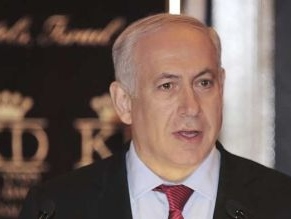|
World Jewish News

Prime Minister Benjamin Netanyahu speaks during his meeting with EU ambassadors in Jerusalem, Monday, April 11, 2011. Photo by: AP
|
Netanyahu mulling West Bank pullout to stave off 'diplomatic tsunami'
12.04.2011, Israel Prime Minister Benjamin Netanyahu is weighing a withdrawal of Israel Defense Forces troops from the West Bank and a series of other measures to block the "diplomatic tsunami" that may follow international recognition of a Palestinian state within the 1967 borders at the United Nations General Assembly in September.
The extent of the withdrawal is still unclear, but at this stage Netanyahu is not considering the evacuation of settlements.
Netanyahu believes that there is very little chance of resuming negotiations with the Palestinians but is examining ideas for steps that would be taken in the absence of negotiations to demonstrate an Israeli diplomatic initiative that would rally the United States, the European Union and other Western countries against a unilateral Palestinian move in the UN.
Netanyahu commented on the matter during a meeting with European Union envoys on Monday, after he was asked whether he planned to give a political address soon.
"I have not decided what to say, and when to say it," the prime minister said.
Netanyahu said: "But two questions should be asked. The first, whether it is at all possible to resume negotiations with the Palestinians? The second question is what actions can be undertaken if resumption of negotiations proves impossible?
Conversations with two Israeli sources with ties to Netanyahu's bureau led to the conclusion that there are three main ideas being considered.
The first involves another withdrawal in the West Bank, which would see the IDF forces redeploy and security responsibility handed over to the Palestinian Authority. This would mean that in Area B, where Israel has security responsibility and the Palestinians civilian policing functions, full control would be ceded to the PA. In addition, some parts of Area C, where Israel has complete control, will become Area B.
Attorney Isaac Molcho, who advises the prime minister, raised this idea in a meeting with emissaries of the Quartet in Jerusalem last week.
Netanyahu is still uncertain to what extent the withdrawal would be, but it will probably not include the evacuation of settlements.
The second idea is to seek an international umbrella in the form of an international conference, in which both Israel and the Palestinian Authority would participate, and which would call for a resumption of negotiations. Even though Netanyahu's advisers have raised the idea before their international interlocutors, the likelihood for holding such a meet is minimal. Neither Israel nor the Palestinians appears able to decide on the Terms of Reference or, in lay terms, the principles of the conference.
The third idea is to use diplomatic pressure on Western countries (the U.S., the European Union, Canada, Australia and others ) against the recognition of a Palestinian state at the UN General Assembly.
Netanyahu told EU ambassadors on Wednesday that more than 100 countries, mostly from the developing world, will recognize a Palestinian state. He said that he wants to rally democracies who share values with Israel against the move.
"Perhaps the Palestinians will have a majority in the UN, but what matters is not only the quantity but also the quality," Netanyahu said.
The Palestinians are hoping that if the General Assembly votes in favor of a Palestinian state in the 1967 borders, they will then be able to take up a seat as a full member of the United Nations. This will change the situation into a conflict in which Israel is occupying another country, which may result in severe international sanctions against Israel.
Netanyahu has said in private talks that he does not "take lightly" the Palestinian move at the UN, "but we should also not exaggerate its implications."
The prime minister has said that there have been plenty of anti-Israeli decisions at the UN, but "no one can impose a solution on Israel."
Sources close to Netanyahu's bureau told Haaretz that the prime minister is fully aware of the dangers facing Israel ahead of September, especially the possibility of international isolation. However, they say, Netanyahu is opting for tactical solutions to what is essentially a strategic problem, and such steps will not suffice in blocking the political tsunami that is forming against Israel.
One source said: "Many near Netanyahu, especially some of the advisers in his bureau, are not helping him to take the right decisions. They are convincing him there is no need to take substantive moves, and that things will be fine."
The source added: "Netanyahu is not willing to negotiate on 1967 borders with exchange of territory, and in the end he will be faced with a UN decision on a Palestinian state in the 1967 borders, without territorial exchanges."
Haaretz.com
|
|
